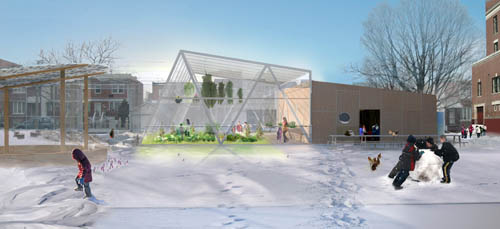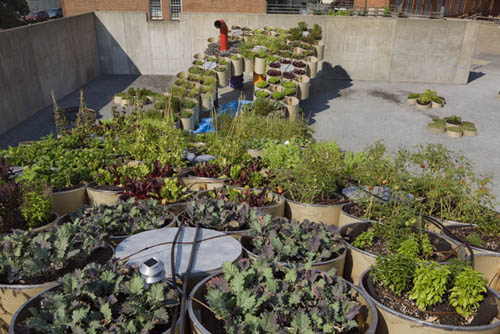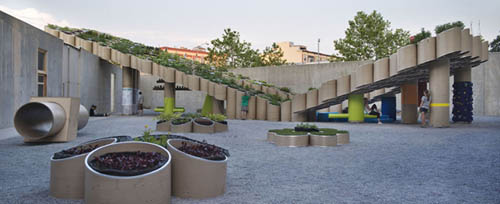Educational Agriculture
 [Image: Edible Schoolyard by WORKac].
[Image: Edible Schoolyard by WORKac].Nicola Twilley and Sarah Rich will be hosting Foodprint NYC later today at Studio-X in Manhattan (the event is free and located at 180 Varick Street, Suite 1610; here is a map).
Things kick off at 1pm, as you can see on the Foodprint Project website.

 [Images: Edible Schoolyard by WORKac].
[Images: Edible Schoolyard by WORKac].The above images, meanwhile, come from the Edible Schoolyard by WORKac. Amale Andraos, co-principal with Dan Wood in WORKac, will be speaking on a panel at 4:30pm today about her firm's work with nutritional landscapes, educational agriculture, and the future of urban food production.
Edible Schoolyard, specifically, presents "a series of interlinked sustainable systems that produce energy and heat, collect rainwater, process compost and sort waste with an off-grid infrastructure."
- At the heart of the project is the Kitchen Classroom, where up to thirty students can prepare and enjoy meals together. The kitchen’s butterfly-shaped roof channels rain water for reclamation. Connected to one side is the Mobile Greenhouse, extending the growing season by covering 1600sf of soil in the colder months and sliding away in the spring, over the Kitchen Classroom. On the other side is the Systems Wall: a series of spaces that include a cistern, space for composting and waste-sorting, solar batteries, dishwashing facilities, a tool shed and a chicken coop.

 [Image: Public Farm 1 by WORKac; photos by Raymond Adams].
[Image: Public Farm 1 by WORKac; photos by Raymond Adams].Joining Amale Andraos on the panel today will be Marcelo Coelho (of "Cornucopia" fame, a 3D food-printer designed with Amit Zoran), Natalie Jeremijenko (of, among many, many other things, the Cross Species Cookbook), and Beverly Tepper (Professor of Food Science at Rutgers and director of the Sensory Evaluation Laboratory). As Edible Geography describes it, "the result will be a speculative and wide-ranging conversation about food security, sensory design, and [the panelists'] hopes and fears for the future of food in New York City."
That is only the final of four panels; read more about today's event over on the Foodprint Project website.





Comments are moderated.
If it's not spam, it will appear here shortly!
A lot of people don’t know enough about farming and food production. This is a really important issue and a great response.
Post a Comment